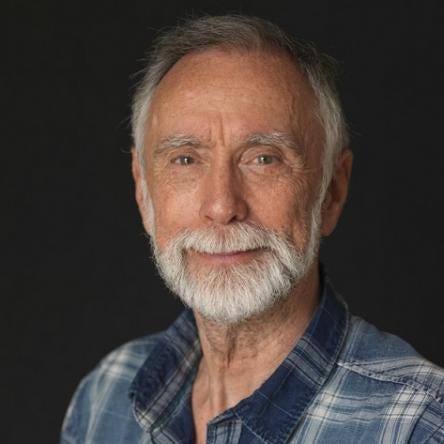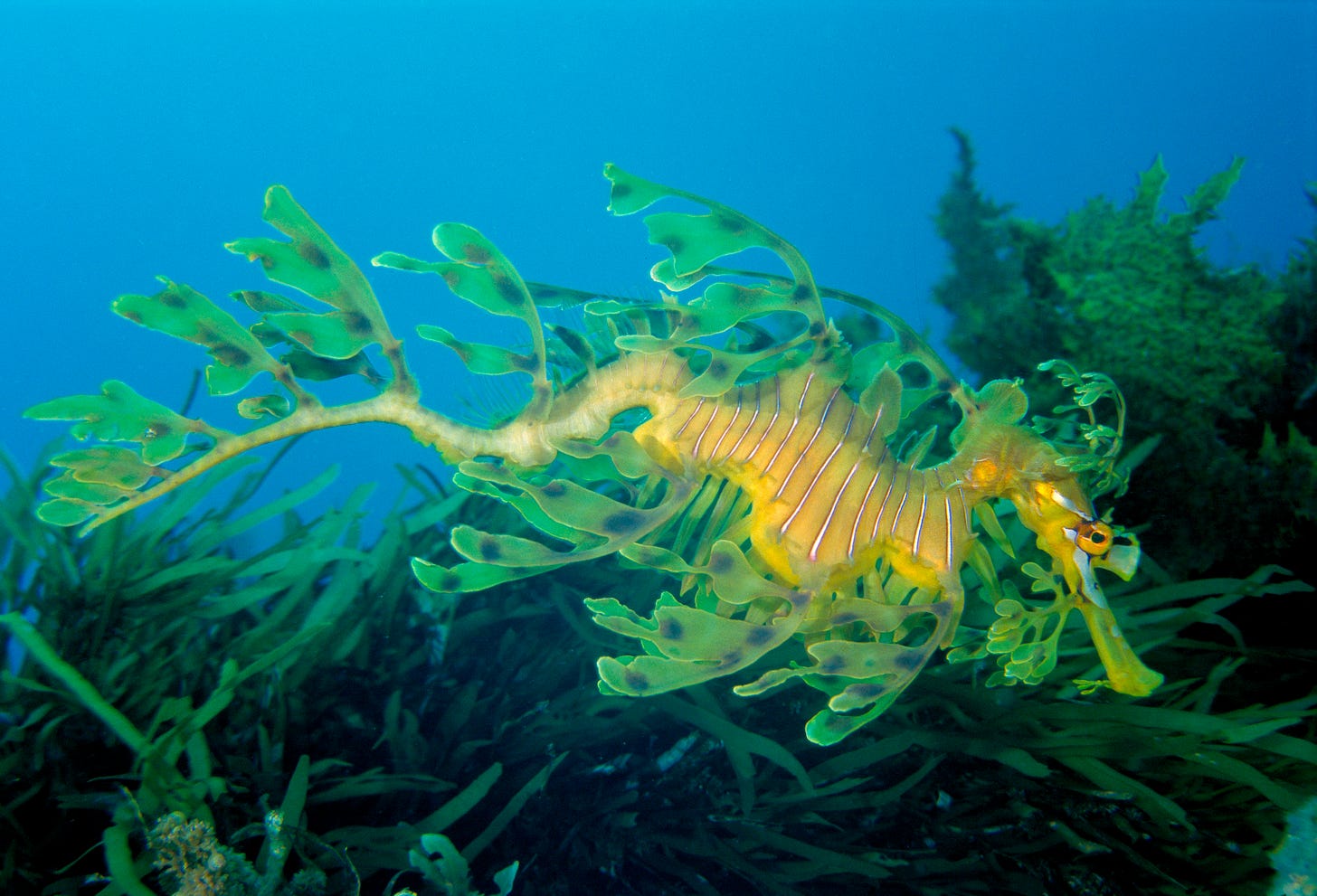Meet Dos Winkel - Ocean Defender
saving our seas, rules for health, & the power of inflexibility
Welcome to People Like You, a weekly newsletter that explores the stories, questions, and ideas that help people design a better life.
This edition at a glance:
Dos Winkel: the sea is his life
Three rules for a healthy life
The power of inflexibility
One question for you
Meet Dos Winkel - ocean protector, underwater photographer - °1947
WHY DOS?
Dos Winkel is a legend in underwater photography (and his books are a fixed feature on my coffee table). For five decades, he and his wife Bertie, traversed the globe. While she focused her lens on tribal communities, Dos immersed himself in capturing the wonders of the deep. When he noticed the alarming rate of decline in marine life, he took action by founding the Sea First Foundation. Despite delivering his farewell address last year due to battling cancer, Dos's dedication to the cause of marine conservation remains steadfast. We had coffee, vegan cookies, and a long talk. (All images in the newsletter: courtesy of Dos Winkel)
Dos, how are you faring these days?
Physically, I'm holding up quite well. Despite my health-conscious lifestyle, I was confronted with cancer eleven years ago – initially, prostate cancer, which has since proliferated into approximately two hundred small tumors in my abdomen. I’ve opted out of chemotherapy, as I hope to continue caring for my wife who has been living with Parkinson's disease for years. I've stepped back from speaking engagements at Sea First, but I remain closely involved as its honorary chairman, overseeing logistical operations and staying abreast of the latest research. The sea has been, and will always be, my life.
What drove you to establish the Sea First Foundation?
My diving experiences provided me with firsthand observations of the sea's plight – a decline in fish and marine life across various ecosystems. Coral reefs ailing, mangrove forests disappearing, and the overall deterioration of marine habitats painted a grim picture. I consulted experts across the globe, and they all agreed: that human activities were the primary drivers of this crisis. Thus, in 2009, I founded the Sea First Foundation with a core mission of teaching ocean literacy – shedding light on marine life and the issues it faces.
What’s the root cause of the problem?
The warming of the Earth and our seas. Many people only worry about CO2, but the effect of methane and nitrous oxide, both byproducts of the animal industry, is respectively 86 and 310 times greater! Globally, with 8.2 billion people, we consume 82 billion farm animals per year. All these animals produce CO2, methane (CH4), and nitrous oxide (N2O). And all these animals need to be fed. To grow that feed, we need the surface area of all of North and South America combined. And what all those cut-down trees can no longer absorb in CO2 mostly ends up in the ocean, leading to acidification, with dramatic consequences for marine life. At least half of our oxygen is produced by the ocean – metaphorically speaking, every other breath you take comes from the sea. The solution is simple: shift towards a more plant-based diet.
And what if we were to eat fish instead of meat?
Eating fish exacerbates the problem. Fish are our allies in the fight against climate change. When fish eat, they ingest acidic seawater and calcium. Their excrement contains so-called 'poop stones' (small calcium carbonate granules). These sink to the seabed and provide excellent substrate for the animals living there. So, every fish caught accelerates global warming. Furthermore, fishing still occurs where it's not allowed. And what comes out of the sea is full of toxins, including micro and nano plastics. You don't need to eat fish for Omega-3 fatty acids – fish don't produce these fatty acids themselves; they obtain them by consuming certain plankton algae, which we can perfectly cultivate on land. What may also be new to many people is that fish have a well-developed central and peripheral nervous system. Fish feel fear, stress, and pain in response to all kinds of trauma – especially in their mouths.
Back to the ocean. What was your last dive?
In the Seychelles, five years ago. What I saw there shocked me. Fishing with longlines is one of the biggest industries there, and it creates massive devastation – birds, turtles, and dolphins get caught on those longlines and suffer a terrible drowning death. The bycatch is simply discarded. I was devastated and had seen enough. Since then, I've been even more dedicated to Sea First. I've seen and photographed a lot of beautiful things, and we use that material to illustrate our lessons and lectures. I even discovered five new species, but no, nothing has been named after me yet. Because then you have to say where exactly you found it and then researchers will go and catch and dissect that animal – but I don't want that.
Can you share some of your most memorable diving experiences and favorite dive spots?
Choosing among the countless extraordinary dive sites is a daunting task. From rainforests to mangrove forests, mountain lakes to coral reefs, they all offered breathtaking encounters with marine life. However, if pressed, Hidden Bay in the Raja Ampat archipelago, west of West Papua's Bird's Head Peninsula in Indonesia, stands out. It was discovered by a friend from the air using a makeshift helicopter. I'd gladly spend a week in a boat there again – armed with provisions, camera gear, and scuba gear.
What's the smallest and most impactful action my readers can take to help protect the oceans?
While we await regulatory approval for cultured meat and fish by the European Food Safety Authority, I advocate for a gradual shift towards a plant-centric diet. Progressively transitioning from flexitarianism to vegetarianism and, ideally, veganism holds immense promise for future generations. Alongside dietary adjustments, embracing green energy and phasing out reliance on fossil fuels are critical steps. Additionally, supporting political parties that oppose subsidies to the meat and fishing industries can drive meaningful change. Redirecting these funds towards retraining fishermen for sustainable occupations, as demonstrated by Sweden, represents a proactive solution.
On behalf of the ocean and our planet: thank you, Dos, for your lifelong commitment to marine conservation.
=> You can explore the Sea First Foundation's initiatives, educational resources, and vegan recipes here.
=> For captivating glimpses into Dos and Bertie's adventures, visit their website.
THREE RULES FOR A HEALTHY LIFE, FROM DOS
When I was still a physical therapist, I always worked long days. However, I ALWAYS had my assistants block 3 evenings a week, for me to engage in sports: tennis, athletics, and cycling. I learned this from my patients who were suffering from burnout: staying active is the best way to keep our bodies and minds healthy.
I also blocked out four full months a year – for travel and relaxing holidays, which later became paid photography assignments.
Combine this with a healthy diet. Unfortunately, this didn’t grant me a long life – we can’t overrule DNA and heredity. That being said: my healthy lifestyle has been instrumental in the prevention of mental and physical illness.
THE POWER OF INFLEXIBILITY
Dos’s pledges to exercise, quarterly vacations, and a strict vegan diet reminded me of an excellent essay in Rolf Dobelli’s “The Art of the Good Life” – on the power of pledges and inflexibilty as a stratagem.
The core idea: make a choice once, and stick to it, uncompromisingly inflexible. Just like Hernán Cortés burning his ships when he reached Mexico, or the CEO who decided that she will NEVER eat dessert at obligatory dinners. Once you fix a rule, stick to it.
“Flexibility makes you unhappy and tired, and it distracts you from your goals. Chain yourself to your pledges. Uncompromisingly. It’s easier to stick to your pledges 100 percent of the time rather than 99 percent.” — Rolf Dobelli
This approach has two benefits:
1. It reduces decision fatigue. ‘A brain exhausted by decision-making will plump for the most convenient option, which more often than not is also the worst one’. In other words: take some time to make a great decision once, instead of relying on willpower or your mood each time you consider the options. Steve Jobs’ standard outfit was another example of his saving his willpower and decision-making for more important choices.
2. It helps you build a reputation. Pledges and inflexibility signal what you stand for, and after a while, people won’t try to convince you otherwise. Warren Buffett famously never negotiates on price – you can make him precisely one offer. Because every potential seller knows this, Buffett will always get offered the best deal, from the get-go.
One of my personal pledges: I NEVER eat meat or fish.
It doesn’t matter whether the animal lived a great life and was shot by a hunter, whether it fell out of the sky straight into my lap, or whether it’s a battery hen. It literally doesn’t matter – I’ve made the decision once, and I never have to think about it again. By now, pretty much all my relatives and friends know about this. (Maybe that’s why I get so few dinner invites?)
ONE QUESTION FOR YOU
Consider an area in your life where you end up making less-than-optimal choices.
(this could be exercise, diet, habits, parenting, friendships, …)
=> What’s ONE decision you can make today that would eliminate a lot of (bad) decisions later?
I’d love to hear what decisions you think of.
Let me know by replying to this email, or leaving a comment below.
Thanks, and may you be well.
Kris 🙏









Thanks Kris, another beautifully written and insightful read. Thank you for spreading what we need to be aware of. Wishing Dos and his wife all the best ✨
Another interesting and thought provoking read.. space being made on my coffee table! Keep them coming..